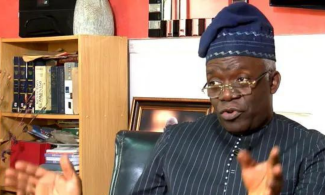
Falana, who said this on Monday while featuring on Channels Television’s Sunrise Daily programme, said that media organisations in Nigeria did not any longer fight corruption as was obtainable in 1970s before the birth of the Economic and Financial Crimes Commission (EFCC), the Independent Corrupt Practices and Other Related Offences Commission (ICPC) and other anti-corruption agencies in the country.
Renowned human rights lawyer, Femi Falana, SAN, has said that among print and electronic media organisations in Nigeria, the only one which can still be relied on to expose corruption is Sahara Reporters.
Falana, who said this on Monday while featuring on Channels Television’s Sunrise Daily programme, said that media organisations in Nigeria did not any longer fight corruption as was obtainable in 1970s before the birth of the Economic and Financial Crimes Commission (EFCC), the Independent Corrupt Practices and Other Related Offences Commission (ICPC) and other anti-corruption agencies in the country.
He said that "The media used to fight corruption in Nigeria before the birth of the EFCC, the ICPC and the rest of them. It was the duty of the media in Nigeria to fight corruption.”
According to the Senior Advocate of Nigeria, "In the 70s, all you needed to do, if you knew that a public officer was corrupt, you simply go to a court, file an affidavit that this guy collected so much money or he had awarded this contract to his friend or a family member, therefore, he has committed corruption.
"From that moment, the press will pick it up and sit on it until the officer was forced to resign or the officer decides on his own to quit the government.
"But these days, the media cannot be relied upon when it comes to exposing corruption, maybe apart from Sahara Reporters, you hardly find stories about corruption in other print and electronic media. So, that area will have to be addressed."
Falana said that Nigerians must realise that the governments generally, not just in Nigeria, does not fight corruption; adding that it was the duty of the people, particularly, victims of corruption assisted or led by civil society organisations like the trade unions, civil rights movements to expose corruption.
He noted that in the case of Nigeria, Nigerians must take advantage of the provisions of the law to write petitions, follow up the petitions and ensure that they are fully investigated and anybody who is indicted will have to be brought to book.
The lawyer stressed that "Because of class solidarity on the part of the government and those who are indicted for corruption, it is difficult for the government to muster the political will to fight corruption. Therefore, it is the duty of Nigerian people to expose corruption."